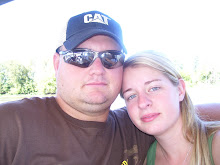
Although some of my friends find it funny, one of my favorite things about the New Year is that it brings with it a new fiscal year. I am a big Dave Ramsey fan and am definitely the "nerd" in the relationship for those who know what that means. Picture me with a giant pie chart dictating to my husband as though I am the CEO of a giant corporation. Okay, so that hasn't actually happened yet, but I can see it in my future.
Anyway, I thought I would share how we handle bookkeeping here at the farm. It has been a big change for me to go from having my little utility bills and car payment to now having thousands of dollars cross the desk at any given time. It has also been a big change for my husband to shift from his old bookkeeping method: shoving everything in a box and sorting it in to piles at the end of the year. After a couple years of working together we have developed a pretty good system and hope to refine it even more this year.
INCOMING:
One key part of keeping track of everything is keeping everything. My husband (and myself) are now both in the habit of keeping all of our receipts. Transactions made with our debit cards are most important but we also save almost all cash receipts except for petty little things, i.e. bought a candy bar at the gas station. All receipts go into the "receipt basket". My husband makes notes on a lot of receipts if they require clarification. For example, 3 IN GAL - Qty 12 on a receipt may mean he bought 12 3" galvanized bolts to repair the sliding door on the shed. I need to know a)what it is and b)what is it for, so he makes notes like "Bolts for shed door" on the top. That helps a lot! Of course if he forgets to note it I can quiz him on it when I find the receipt and he usually remembers.
Along with receipts we also put our deposit slips from the bank in the "receipt basket". Pay stubs go in there too but since they are usually reflected on the deposit slip I don't do much with them besides file them. Now, say Brian goes and puts his check in the bank but also puts in a $300 check from hay our neighbor purchased and $200 cash from a tool he sold. He makes a note on the deposit slip "My check + $300 hay + $200 sold drill". So when I enter the transaction in the computer I can get the amount off his pay stub and then know where the rest came from.
SOFTWARE:
We started out using Quicken and this fall switched to Quickbooks. We paid more by buying it from Greenstone Farm Credit Service but in trade we can get unlimited advice and guidance on how to use it. Quicken was fine but I really want to be able to break down our finances in to classes, or enterprises (ex. calves, poultry, soybeans, corn). That way we can see which areas are making us money and which aren't. Quickbooks will allow us to do that. I have not yet broken our farm down by class but hope to initiate that soon.
ENTERING DATA:
So basically I take everything from the receipt basket and enter it in to Quickbooks. I have all of our bank accounts on there. As I said, I run most cash transactions through as well. I usually pull up our online banking at the same time and enter any transactions that I don't have a receipt for. Then I go back through and reconcile each account. I do this every few days or at least once a week.
CHECKS:
A word about checks: when we write them, we enter them in our check register. No other transactions get written in the register and we do not balance it on paper. With two people working off one checking account and both of us using our debit cards almost all the time, keeping a written check register was just an extra step for us. If a person wants I suppose you could print your Quickbooks register regularly and keep it in a binder or something. Also, we are using fewer checks all the time as I'm paying more and more bills online. Even if the company isn't online you can pay any bill through your bank's bill pay option.
BILLS:
Speaking of bills, here's how we handle them. As soon as we get them they go in the "bill basket". When we pay them I write the date, amount, check #, and any other applicable information on them and then put them in the "receipt basket". That way they all get entered in to Quickbooks.
AFTER ENTERING:
When I sit down and enter everything from the receipt basket I mark each paper in ink with "(Check mark) QB" so I know it has been run through. Then it goes to the "to file basket". Once every few months, when it is overflowing, I take the "to file basket" over to the filing cabinet and file everything. Receipts are broken down in to personal (pretty much only food & clothes), farm, and Tractor Supply Company (TSC). We have a LOT of TSC slips, plus most of our purchases there are tax free so it is nice to have them kept seperate. I'll probably make more receipt categories as we go.
OTHER BASKETS:
In case anyone is curious, the other baskets on my desk are the "mail basket" and the basket we put all of Brian's relatives' mail in. A long line of Beckers have lived in our house and although the flow has finally slowed we still get some stray mail that doesn't belong to us. We try to sort the mail as it comes in but in a rush we can put the bills in their basket and throw the rest in the mail basket to be sorted later.
I hope this helps anyone else struggling with how to manage farm finances. I can only imagine what really big farms do! This system works really well for us. I would think the same type of setup would apply nicely to a regular household, perhaps with Quicken instead of Quickbooks. You could use bowls or metal boxes if baskets aren't your thing. If anyone needs more technical advice I'll do my best to help you! I'm no pro yet but have learned a lot.











3 comments:
Good for you. I did the books for a short period of time a few years ago for my family's farm market and construction business. It was crazy! Plus my grandmother refused to ask for help, lost mail, and always mixed things up. She stores daily receipts from the market in peach baskets, in long, twisted masses. I was too much for me (and for anybody else, about 5 of us family members took a turn at it after my grandmother couldn't do it, but she did it for many years). Anyway, we now have a bookkeeper from the farm bureau's bank, which has worked out really well for us. So, if it ever becomes too much for you to handle, the farm bureau is a great place to turn.
We had a small free-lance graphic design company for a while, and I was the bookkeeper. Hated it! My husband just "guesstimated" what he should charge each client, while I wanted some sort of system so I could tell clients what to expect, and know whether he was actually making a certain amount of money per hour. I finally bowed out of that task, and then he hated doing it so much himself that finally went to work elsewhere. Small family businesses are hard work.
Dave Ramsey has such great material. I wish we'd had it then.
Abbie - thanks! It does sound like a crazy job you were trying to do. I am pretty lucky in that my hubby is really agreeable (usually!) so when I told him what I thought would help he gladly obliged. I'll keep farm bureau in mind, thanks for the suggestion.
Joyce - I think I would have been like you. I need a clear price, even at the vet clinic it drives me crazy to have to give a really broad estimate. Your husband doesn't still do graphic design on the side does he? I would really like to find someone to design a logo for our farm. I have good Photoshop skills but the farm is so personal to me I'm having a hard time coming up with something simple. Kudos to the Dave Ramsey material, he's my hero when it comes to finances! :)
Post a Comment